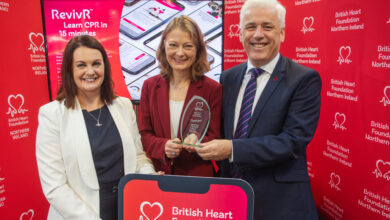Making connections

As Northern Ireland moves towards an integrated care system, there is a key role for social prescribing into future systems for social care delivery, write University of Birmingham’s Robin Miller and Sarah McLaughlin of IMPACTAgewell®.
A person’s social circumstances affect their health and quality of life. This is especially true as people get older. If people retain or regain social connections, they are happier and also less likely to present to a GP or hospital with physical or mental ill-health symptoms.
In Mid and East Antrim, a model of care has demonstrated that connecting older adults with community-based support can ease demand on GPs and accident and emergency (A&E), saving the healthcare system money in doing so – freeing up capacity to treat others.
Tackling isolation and loneliness is central to any effective strategy to improve physical and mental wellbeing in older age. GPs, social workers, community pharmacists, and others refer patients who might benefit from community connections to IMPACTAgewell®, a service that emerged from the Mid and East Antrim Agewell Partnership (MEAAP). IMPACTAgewell® connects older adults with other community groups that provide services including lunch clubs, walking groups, befriending, bereavement counselling, decluttering, benefits reviews, good morning calls – and a wide range of other supports.
It is the quality of the relationships established between IMPACTAgewell® staff and service users that are core to providing high-quality outcomes. These connections have proven especially important post-Covid, with many older people struggling to rebuild social lives after the lockdown. Those relationships are built on empathy and friendly conversations within the homes. It is only through those home visits that proper assessments can be made of a person’s living circumstances and ability to cope.
IMPACTAgewell® has built-up close relationships not only with the service users, but also with professionals and partner agencies. Meeting with GPs, social workers, community pharmacists and community groups in ‘locality hubs’ enables information sharing about patients and to learn which approaches work best.
The principle behind the operations of IMPACTAgewell® is to maximise the use of community assets, linking services with those who need them. This connection is facilitated by the use of social prescribing, which comes with a payment to those community groups that deliver services. Social prescribing is widely used in the rest of the UK and Ireland, but is not recognised in policy or financing by government in Northern Ireland.
Until funding for community pharmacy was lost at the end of last year, the model of care also enabled pharmacists to visit service users in their own homes to conduct medicine reviews. Pharmacists were able to advise patients on how best to use their medications; which drugs should not be used in combination with others; and to dispose of unused drugs.
IMPACTAgewell® services have been audited and found to be extremely cost effective. Every £1 spent on IMPACTAgewell® saves £2.38 through reduced demand for GPs and A&E. Savings through community pharmacy drug reviews are even greater, with each £1 saving £5.81.
A review of the work of IMPACTAgewell® conducted by the UK Centre for Improving Adult Social Care Together has concluded that its work is very effective and recommends not only that it should continue, but also that its activities should act as a model for replication across Northern Ireland and elsewhere.
Northern Ireland is in the process of establishing an integrated care system, with ICS boards in each health trust region. These boards need to recognise the core role of the voluntary and community sector in social care delivery and include its representatives in their decision-making, planning, and delivery arrangements. The review also suggests that social prescribing be built into future systems for social care delivery (as is the case in Great Britain) along with the funding to enable this.
Social care is one of the so-called ‘wicked issues’, cutting across many government silos – and needs to be addressed as such by the new integrated care system. For example, community transport is funded in Northern Ireland by the Department for Infrastructure, yet its operations are central to the capacity of older adults and people with disabilities to benefit from social care services. It is also essential for many patients to attend medical appointments. This will become even more true as the hospital reform programme continues, with Antrim, Craigavon and Enniskillen hospitals, for example, being very difficult to access via public transport.
Another recommendation is that more needs to be done to address the specific challenges faced by the growing ethnic minority population. Typically new arrivals will not be familiar with the ‘gatekeeper’ system of GPs used by the NHS. Guidance on how to navigate the NHS and the social care, social housing and benefits systems would make their lives much easier.
|
IMPACTAgewell® IMPACTAgewell® is the Northern Ireland demonstrator agency in a UK-wide programme that aims to spread learning and best practice in adult social care. The national programme is funded by the Economic and Social Research Council and the Health Foundation, with the intention that lessons learnt are applied UK-wide. It is led on a UK basis by the University of Birmingham, with Ulster University the Northern Ireland partner. IMPACTAgewell® has also received financial support from the Dunhill Trust. |





